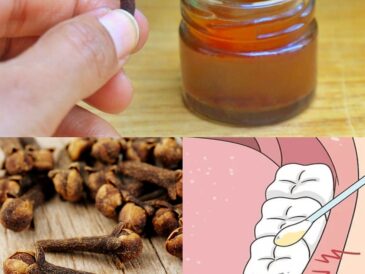- Whole clove (traditional method):
- Gently hold a single whole clove between the cheek and the painful tooth so the clove’s oils are released slowly. Chew only slightly if needed to release oils, then stop—don’t chew into a paste. Remove when discomfort eases. This gives mild, gradual relief.
- Clove oil (concentrated):
- Always dilute: mix 1 drop of clove oil with about 1 teaspoon (5 mL) of a carrier oil (olive oil, coconut oil, or almond oil).
- Soak a small cotton ball or cotton swab in the diluted mix and press it briefly against the painful tooth or gum. Remove after a minute or two if you feel burning or irritation. Repeat as needed, but avoid leaving undiluted oil on the gum or swallowing it.
- Do not apply undiluted clove oil directly to oral tissues — that can cause burns, irritation, or even local tissue damage.
- Store-bought dental clove gel:
- Many commercial dental gels contain eugenol or clove extracts in safe concentrations. Follow the product instructions.
Expect relief within minutes in many people, but the effect is often temporary. If pain persists more than 24–48 hours or is severe (fever, facial swelling, difficulty breathing or swallowing), seek urgent dental or medical care.
(These practical steps reflect common clinical advice and the dilution approach used in many safety recommendations.) Medical News Today+1
Benefits beyond numbing: antibacterial and anti-inflammatory actions
Laboratory (in vitro) and some clinical studies show that clove oil and eugenol can inhibit growth of certain oral bacteria and reduce markers of inflammation — properties that may help reduce infection-related discomfort temporarily. However, while these actions are promising, laboratory results don’t always translate into cures in real mouths; established dental infection often requires professional care (antibiotics, drainage, root canal). PMC+1
Risks and important safety warnings
- Tissue irritation and burns: Undiluted clove oil can irritate or damage oral mucosa. Use diluted preparations and remove immediately if burning or intense stinging occurs. PMC
- Toxicity in high doses or children: Concentrated eugenol can be toxic if swallowed in large amounts and has been linked to liver injury or seizures in rare cases, especially in young children. Keep clove oil out of reach of children. NCBI+1
- Bleeding risk and drug interactions: Eugenol can affect blood clotting; people on blood thinners (warfarin, etc.) or with bleeding disorders should consult a healthcare professional before using concentrated clove oil. Eugenol may also interact with medications metabolized by the liver. PMC+1
- Allergic reactions: A small number of people may develop contact allergy or sensitivity to clove or eugenol.
Because of these risks, avoid giving clove oil to infants and very young children, and use caution with pregnant or breastfeeding people and anyone with liver disease or significant medical conditions. PMC+1
When cloves are appropriate — and when they’re not
Appropriate: for short-term symptomatic relief of mild to moderate tooth pain while you arrange dental care; for temporary relief after a filling or dental work if recommended by your dentist.
Not appropriate: as a permanent treatment for severe infections, abscesses, extensive decay, or prolonged pain. If you have swelling, fever, spreading redness or systemic symptoms, seek immediate dental/medical attention. Clove oil is a first-aid measure — not definitive therapy. PMC
Bottom line
Holding a clove in your mouth or applying diluted clove oil can reduce tooth pain quickly for many people because of eugenol’s numbing, anti-inflammatory and antibacterial properties. Clinical studies support clove’s short-term analgesic effects and show it can be comparable to some topical anesthetics for temporary pain relief. However, clove/oil must be used with care (dilute it, avoid ingestion, and keep it away from children), and it cannot replace professional dental diagnosis and treatment when problems are serious or persistent. ScienceDirect+2PMC+2
Selected references and further reading
- Nejad SM, et al. Pharmacological and Toxicological Properties of Eugenol. (Review). PMC. PMC
- Alqareer A., et al. The effect of clove and benzocaine versus placebo as topical anesthetics. (Randomized clinical study). ScienceDirect
- Silva MV, et al. Clove essential oil and eugenol: A review of their applications and effects. (2024 review). ScienceDirect
- In vitro studies on clove essential oil’s antibacterial effects and eugenol’s activity. PMC+1
- LiverTox / NCBI: safety profile for eugenol and clove oils. NCBI




